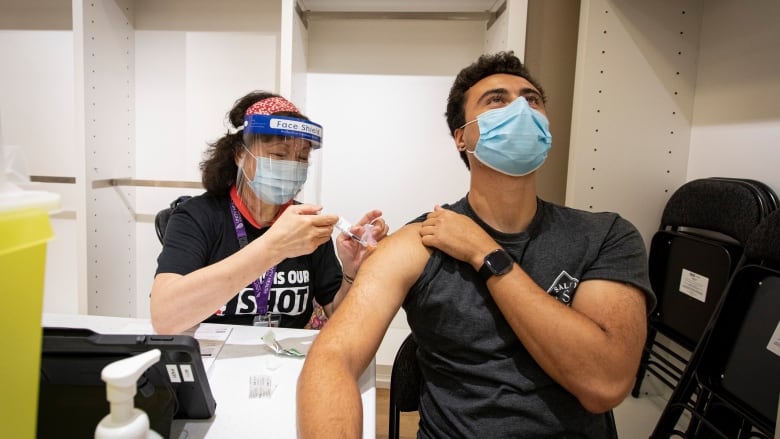Fully vaccinated should mean 3 doses, says head of Ontario's COVID-19 science table
As novel coronavirus evolves, studies show 2 doses not as effective in preventing infections

The headof Ontario's COVID-19 science advisory table is calling on the province to change the definition of the term "fully vaccinated" from two to three doses, even though Premier Doug Ford said this week his government wasn't yet planning to do so.
"Two doses of the vaccine continued to protect quite well against hospital and ICU admissions,but there's absolutely no relevant protection against infection," saidDr. Peter Jni, the table's scientific director,.in an interview with CBC News.
Jni points out the purpose of Ontario's proof of vaccination certificate was not only to keep people out of the hospital, but also to prevent transmission in high-risk settings something that has become much more challenging with the highly contagious Omicron variant of the novel coronavirus, which touched off a wave of cases, hospitalizations, intensive care admissions and deaths this past month.
His comments come after Premier Doug Ford announced a plan Thursday for re-opening in Ontario. Starting Jan. 31, many indoor settings, including restaurants, bars and gyms will be able to reopen with 50 per cent capacity limits.
On Feb. 21, capacity limits will lift on all indoor spaces where proof of vaccination is required. In high-risk settings that requireproof of immunization, like nightclubs, there will be a 25 per cent cap on capacity.
Finally, on March 14, all capacity limits on indoor spaces will be lifted. Proof of vaccination requirements will stay in place where they already exist.
Province, fedswon't change definition yet
During Thursday'sreopening announcement,Ford said the province will notbe changing the guidelines yet to three doses. Earlier in January, Canada's Medical Officer of Health Teresa Tam said federal health officials were not considering a change either.
But Junisays changing the definition of fully vaccinated is "the next logical thing to do now with Omicron being dominant."
- Have a coronavirus question or news tip for CBC News? Email: ask@cbc.ca or join us live in the comments now.

Three U.S. studies released Friday offered more evidence thatthree shots are more effective against preventing hospitalization and infectiondue tothe Omicron variant.
The papers echo previous research including studies in Germany, South Africa and the United Kingdom.
Change would be 'confusing,' expert says
But Prabhat Jha, an epidemiologist at St. Michael's Hospital in Toronto, sayschangingwhat it means to be fully vaccinated would be "confusing."
"We don't know if the future might require us to have annual booster shots," he said in an interview this week.
Jha sayshewould rathersee the province provide guidelines on the number of vaccinations required for various settings.
"I would certainly feel comfortable sitting beside someone who said they've been double vaxxed."
He saysthree doses should be the standard for settings like long-term care homes and hospitals, but two shots is enough for bars, restaurants and sporting venues when the province isnot experiencinga wave of infections.
"If our goal is to restore our usual economic and social activity keeping [two doses] as a standard should be fine."












_(720p).jpg)


 OFFICIAL HD MUSIC VIDEO.jpg)
.jpg)



























































































